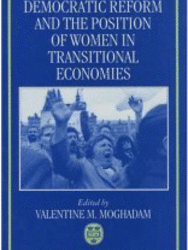Book
Democratic Reform and the Position of Women in Transitional Economies
Exploring the effects of the post-1989 developments in Eastern and Central Europe on the social and economic position of the women of the region, Valentine Moghadam explains how the economic crisis and subsequent development, social breakdown, and changing institutions and practices of the state have an impact upon women's roles and status.
The volume combines a theoretical analysis of fundamental gender specific issues and empirical studies on aspects such as educational attainment, social security provisions, political representation, and level and type of employment. Several papers use comparative analysis, drawing on previous research into women's position during development in the Third World, and under socialism in the years prior to 1989.
Countries covered in empirical case studies are Russia, Estonia, Poland, the Czech and Slovak republics, the former East Germany, Hungary, and Bulgaria. The authors draw the conclusion that women are among the principal losers in the restructuring process, both through the rise in conservative cultures, and through the economic imperatives of competing in a market-based system.
 Join the network
Join the network